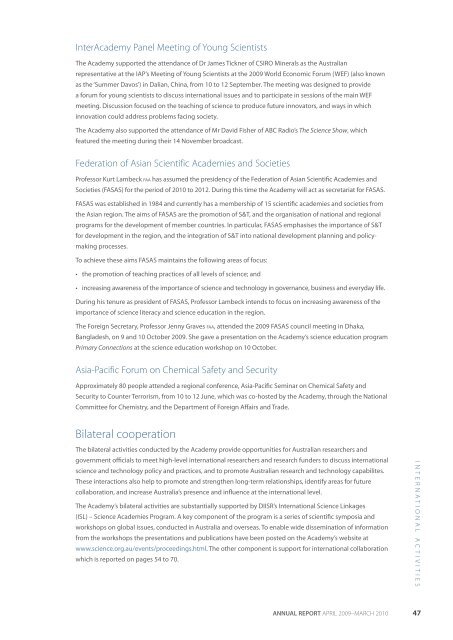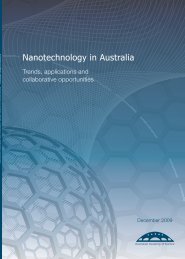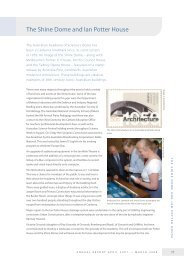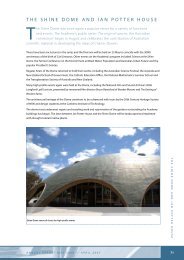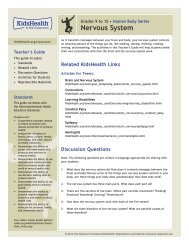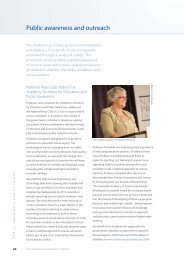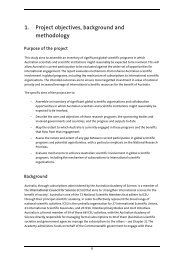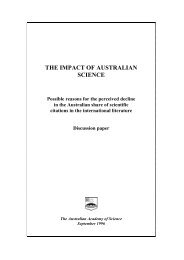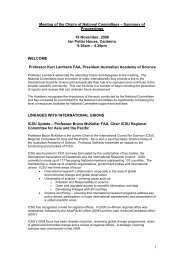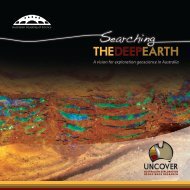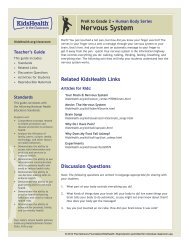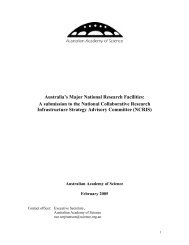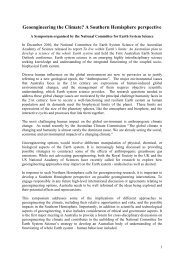ANNUAL REPORT - Australian Academy of Science
ANNUAL REPORT - Australian Academy of Science
ANNUAL REPORT - Australian Academy of Science
You also want an ePaper? Increase the reach of your titles
YUMPU automatically turns print PDFs into web optimized ePapers that Google loves.
Inter<strong>Academy</strong> Panel Meeting <strong>of</strong> Young Scientists<br />
The <strong>Academy</strong> supported the attendance <strong>of</strong> Dr James Tickner <strong>of</strong> CSIRO Minerals as the <strong>Australian</strong><br />
representative at the IAP’s Meeting <strong>of</strong> Young Scientists at the 2009 World Economic Forum (WEF) (also known<br />
as the ‘Summer Davos’) in Dalian, China, from 10 to 12 September. The meeting was designed to provide<br />
a forum for young scientists to discuss international issues and to participate in sessions <strong>of</strong> the main WEF<br />
meeting. Discussion focused on the teaching <strong>of</strong> science to produce future innovators, and ways in which<br />
innovation could address problems facing society.<br />
The <strong>Academy</strong> also supported the attendance <strong>of</strong> Mr David Fisher <strong>of</strong> ABC Radio’s The <strong>Science</strong> Show, which<br />
featured the meeting during their 14 November broadcast.<br />
Federation <strong>of</strong> Asian Scientific Academies and Societies<br />
Pr<strong>of</strong>essor Kurt Lambeck FAA has assumed the presidency <strong>of</strong> the Federation <strong>of</strong> Asian Scientific Academies and<br />
Societies (FASAS) for the period <strong>of</strong> 2010 to 2012. During this time the <strong>Academy</strong> will act as secretariat for FASAS.<br />
FASAS was established in 1984 and currently has a membership <strong>of</strong> 15 scientific academies and societies from<br />
the Asian region. The aims <strong>of</strong> FASAS are the promotion <strong>of</strong> S&T, and the organisation <strong>of</strong> national and regional<br />
programs for the development <strong>of</strong> member countries. In particular, FASAS emphasises the importance <strong>of</strong> S&T<br />
for development in the region, and the integration <strong>of</strong> S&T into national development planning and policymaking<br />
processes.<br />
To achieve these aims FASAS maintains the following areas <strong>of</strong> focus:<br />
• the promotion <strong>of</strong> teaching practices <strong>of</strong> all levels <strong>of</strong> science; and<br />
• increasing awareness <strong>of</strong> the importance <strong>of</strong> science and technology in governance, business and everyday life.<br />
During his tenure as president <strong>of</strong> FASAS, Pr<strong>of</strong>essor Lambeck intends to focus on increasing awareness <strong>of</strong> the<br />
importance <strong>of</strong> science literacy and science education in the region.<br />
The Foreign Secretary, Pr<strong>of</strong>essor Jenny Graves FAA, attended the 2009 FASAS council meeting in Dhaka,<br />
Bangladesh, on 9 and 10 October 2009. She gave a presentation on the <strong>Academy</strong>’s science education program<br />
Primary Connections at the science education workshop on 10 October.<br />
Asia-Pacific Forum on Chemical Safety and Security<br />
Approximately 80 people attended a regional conference, Asia-Pacific Seminar on Chemical Safety and<br />
Security to Counter Terrorism, from 10 to 12 June, which was co-hosted by the <strong>Academy</strong>, through the National<br />
Committee for Chemistry, and the Department <strong>of</strong> Foreign Affairs and Trade.<br />
Bilateral cooperation<br />
The bilateral activities conducted by the <strong>Academy</strong> provide opportunities for <strong>Australian</strong> researchers and<br />
government <strong>of</strong>ficials to meet high-level international researchers and research funders to discuss international<br />
science and technology policy and practices, and to promote <strong>Australian</strong> research and technology capabilites.<br />
These interactions also help to promote and strengthen long-term relationships, identify areas for future<br />
collaboration, and increase Australia’s presence and influence at the international level.<br />
The <strong>Academy</strong>’s bilateral activities are substantially supported by DIISR’s International <strong>Science</strong> Linkages<br />
(ISL) – <strong>Science</strong> Academies Program. A key component <strong>of</strong> the program is a series <strong>of</strong> scientific symposia and<br />
workshops on global issues, conducted in Australia and overseas. To enable wide dissemination <strong>of</strong> information<br />
from the workshops the presentations and publications have been posted on the <strong>Academy</strong>’s website at<br />
www.science.org.au/events/proceedings.html. The other component is support for international collaboration<br />
which is reported on pages 54 to 70.<br />
INTERNATIONAL ACTIVITIES<br />
<strong>ANNUAL</strong> <strong>REPORT</strong> APRIL 2009–MARCH 2010 47


